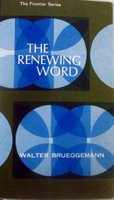
This winter I plan to do an Intro to the Bible from a non-conservative perspective for the congregatio and community. I vaguely remembered the WB wrote some shorter books that dealt on just this topic, so I drove to the library and checked them out. One, thus far, The Renewing Word, has proven helpful:

The other books I am reading for this project by WB:
Confronting the Bible: A Resource and Discussion for Youth
The Creative Word: Canon as a Model for Biblical Education
The Bible Makes Sense
My hunch is that most in the pews (pulpit included)dont know much about the Word. This has created an odd situation when you have pulpits confused between biblical authority and biblical analysis and congregants who wander aimlessly in the biblical narrative.
Most say they want to know more about the Bible.
Most want to read it and know what it is all about.
I hope in some way to get at this issue through preaching and bible study. Perhaps a non-conservative preaching model based on the bible centered church movement, just an idea.
1 comment:
THere are several good Anglican resourses out there. You know. you may want to read some preaching text books as well.
Preaching To Skeptics and Seekers was good. It has a familiar evangelical ring to it. You may find it helpful.
AKM Adam has an interesting book entitled Postmodern Biblical Interpretation. Dry? Somewhat. But it is useful simply because it gives a good way to allow the scripture to stand on its own without the lense of liberalism or fundamentalism weighing in.
Post a Comment